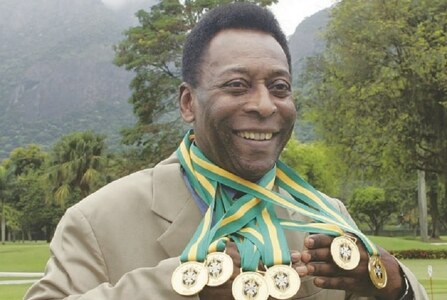IT’S the stuff of folklore; one that’s been passed on from one generation to another in Pakistan. It speaks of a legendary footballer, so good at his sport, a magician with the ball, of once asking to check the height of the cross bar after his shot came off it. The legend goes that the height of the frame wasn’t up to the standard.
It’s one of numerous stories, the historical reference of which is nowhere to be found, associated with Pele — a man who was seen by no one in Pakistan during the height of his playing days yet the reverence was such that no one doubted that. The larger than life Pele’s globe-encompassing presence has now transcended to the other world. The Brazilian great, ‘The King’, passed away on Thursday at the age of 82.
Pele was football’s biggest icon, the first global superstar of the sport; a man whose very being was bigger than it. The only man to win the World Cup three times, he led the sport from monochrome to colour. Colour television had arrived when he lifted world football’s biggest prize for the last time in 1970 but the lack of broadcast or satellite meant pictures weren’t beamed live in Pakistan.
Some heard its coverage on the radio, late into the night as Pele lifted the World Cup trophy in Mexico with a 4-1 victory over Italy in the final. News of his exploits, in any shape of form, kept coming to Pakistan. People may have seen him only in pictures yet, they found a local footballer who was christened as ‘Pakistan Pele’ — Abdul Ghafoor Majna, who shone here at the same time as the Brazilian was starring over the world.
Veteran cricket journalist Qamar Ahmed is one of the lucky few from Pakistan who has seen the great man in his element.
“He was pure magic,” Qamar told Dawn on Friday, recalling the 1966 World Cup in England where Pele was increasingly fouled and eventually put out of the tournament due to injury. But Qamar’s fondest memory is of 1973 when Pele’s boyhood club Santos came to London on their world tour and played Fulham at Craven Cottage. “He scored with an outrageous penalty but Santos lost 2-1,” recalled Qamar. “It was just a joy to see him play.”
As a player, Pele gave so much joy to everyone. Years ahead of his time, his talent was divine, he could do things unimaginable at that time. But Pele — a friend of legendary boxer Muhammad Ali, a highly-revered figure in Pakistan — came into the country’s conscience much after he ended his playing career following a famed stint in the United States.
Having shot to fame as a teenager when he lifted his first World Cup in 1958, Pele’s transformation towards becoming football’s biggest figurehead after he ended his playing days that kept him relevant to the generations that followed.
With New York Cosmos, he’d travelled and played a match in India in the twilight of his career but starring in ‘Escape to Victory’ alongside Sylvester Stallone and Michael Caine in 1981 thrust him into the spotlight in Pakistan.
Then, it was the World Cup of 1982 where the Brazilian dream team captivated the minds. It didn’t end up with the trophy but it gave the live taste of ‘Jogo Bonito’; initiated by Pele, who transformed football into art and entertainment.
Karachi’s locality of Lyari was particularly enchanted. In this marginalised area of the city, identifying with Brazil also had to do with the colour of the skin. Most residents of the area are ethnically Sheedi, tracing their lineage to Africa. Pele was the Black superstar revered globally, one who rose from poverty to become one of the greatest athletes in modern history. His story inspires; he elicited self-identification.
Pakistan’s foreign minister Bilawal Bhutto-Zardari was quick to offer condolences to the people of Lyari in his statement expressing grief over Pele’s death on Friday.
“Pele had had a profound impact on the popularity of the game of football around the globe,” he said.
“Football fans all over the world are in a state of mourning in Pakistan, especially in Sindh, including Lyari in Karachi.”
For them, and for many, a reference point is no more.
Published in Dawn, December 31st, 2022













































